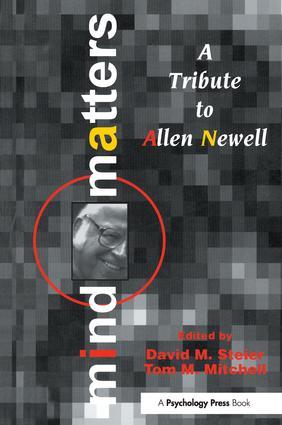
Zustellung: Mi, 22.01. - Sa, 25.01.
Versand in 6 Tagen
VersandkostenfreiBestellen & in Filiale abholen:
Based on a symposium honoring the extensive work of Allen Newell -- one of the founders of artificial intelligence, cognitive science, human-computer interaction, and the systematic study of computational architectures -- this volume demonstrates how unifying themes may be found in the diversity that characterizes current research on computers and cognition. The subject matter includes:
* an overview of cognitive and computer science by leading researchers in the field;
* a comprehensive description of Allen Newell's "Soar" -- a computational architecture he developed as a unified theory of cognition;
* commentary on how the Soar theory of cognition relates to important issues in cognitive and computer science;
* rigorous treatments of controversial issues in cognition -- methodology of cognitive science, hybrid approaches to machine learning, word-sense disambiguation in understanding material language, and the role of capability processing constraints in architectural theory;
* comprehensive and systematic methods for studying architectural evolution in both hardware and software;
* a thorough discussion of the use of analytic models in human computer interaction;
* extensive reviews of important experiments in the study of scientific discovery and deduction; and
* an updated analysis of the role of symbols in information processing by Herbert Simon.
Incorporating the research of top scientists inspired by Newell's work, this volume will be of strong interest to a large variety of scientific communities including psychologists, computational linguists, computer scientists and engineers, and interface designers. It will also be valuable to those who study the scientific process itself, as it chronicles the impact of Newell's approach to research, simultaneously delving into each scientific discipline and producing results that transcend the boundaries of those disciplines.
* an overview of cognitive and computer science by leading researchers in the field;
* a comprehensive description of Allen Newell's "Soar" -- a computational architecture he developed as a unified theory of cognition;
* commentary on how the Soar theory of cognition relates to important issues in cognitive and computer science;
* rigorous treatments of controversial issues in cognition -- methodology of cognitive science, hybrid approaches to machine learning, word-sense disambiguation in understanding material language, and the role of capability processing constraints in architectural theory;
* comprehensive and systematic methods for studying architectural evolution in both hardware and software;
* a thorough discussion of the use of analytic models in human computer interaction;
* extensive reviews of important experiments in the study of scientific discovery and deduction; and
* an updated analysis of the role of symbols in information processing by Herbert Simon.
Incorporating the research of top scientists inspired by Newell's work, this volume will be of strong interest to a large variety of scientific communities including psychologists, computational linguists, computer scientists and engineers, and interface designers. It will also be valuable to those who study the scientific process itself, as it chronicles the impact of Newell's approach to research, simultaneously delving into each scientific discipline and producing results that transcend the boundaries of those disciplines.
Inhaltsverzeichnis
Contents: Preface. J.E. Laird, P.S. Rosenbloom, The Evolution of the Soar Cognitive Architecture. Z.N. Pylyshyn, The Study of Cognitive Architecture. R.L. Lewis, Discussion. Architecture Matters: What Soar Has to Say About Modularity. T.M. Mitchell, S.B. Thrun, Learning Analytically and Inductively. P.S. Rosenbloom, Discussion. Learning Matters. G.A. Miller, Meaning Matters: Problems in Sense Resolution. J.F. Lehman, Discussion. Meaning Matters: Response to Miller. M.A. Just, P.A. Carpenter, D.D. Hemphill, Constraints on Processing Capacity: Architectural or Implementational? R.M. Young, Discussion. Functionality Matters: Capacity Constraints and Soar. G. Bell, Great and Big Ideas in Computer Structures. M. Tambe, Discussion. Parallelism Matters. M. Shaw, Software Architectures for Shared Information Systems. D.M. Steier, Discussion. Mediating Matters: Response to Shaw. S.K. Card, The Human, the Computer, the Task, and Their Interaction -- Analytic Models and Use-Centered Design. B.E. John, Discussion. Task Matters. D. Klahr, Scientific Discovery Processes in Children, Adults, and Machines. T. Simon, Discussion. Development Matters. P.N. Johnson-Laird, The Process of Deduction. T. Polk, Discussion. Reasoning Matters: Mental Models and Soar. H.A. Simon, The Patterned Matter That Is Mind.
Produktdetails
Erscheinungsdatum
01. Juni 1996
Sprache
englisch
Seitenanzahl
490
Herausgegeben von
David M. Steier, Tom M. Mitchell
Verlag/Hersteller
Produktart
kartoniert
Gewicht
703 g
Größe (L/B/H)
229/152/26 mm
ISBN
9780805813647
Entdecken Sie mehr
Bewertungen
0 Bewertungen
Es wurden noch keine Bewertungen abgegeben. Schreiben Sie die erste Bewertung zu "Mind Matters" und helfen Sie damit anderen bei der Kaufentscheidung.










